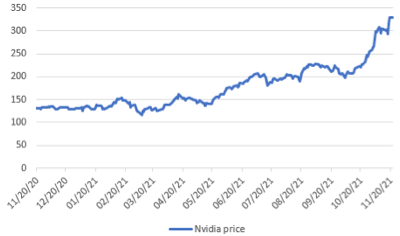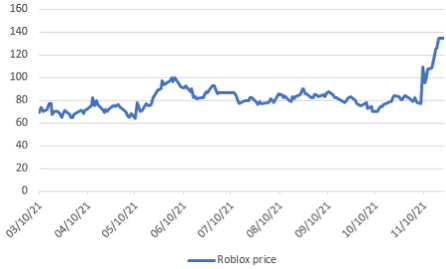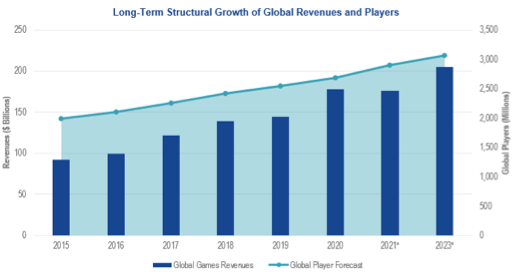Getting in the game
Coming into the end of the year, video gaming companies have lined up a number of releases, among them Halo: Infinite and Final Fantasy XVI, this is on the back of the successful release of Call of Duty: Vanguard.
The video gaming industry is earning billions in annual revenues and we believe there is more to come. In addition to console games, the growth of online virtual worlds, rapidly accelerated by COVID-19, has led to a flurry of attention and activity around what is commonly referred as the metaverse.
The metaverse is a virtual-reality space in which users can interact with a computer-generated environment and other users. Video gaming related stocks, such as Nvidia and Roblox, recently made headlines for their impressive corporate performances following metaverse advancements and impressive Q3 earnings.
The video gaming industry is also supported by long-term trends such as demographic shifts and changing consumer demands, boosting its attractiveness.
Video game industry and the metaverse
The video game industry is earning billions in annual revenues and reaching billions of consumers around the world. In 2020, the total video game industry reached US$177 billion in revenues, making it a bigger industry than both cyber-security and robotics. By 2023, over three billion people around the world are expected to play video games in some form.
The growth of online virtual worlds, rapidly accelerated by COVID-19, has led to a flurry of attention and activity around what is commonly referred as the metaverse. The metaverse is a virtual-reality space in which users can interact with a computer-generated environment and other users. According to analytics and market research company Newzoo, the metaverse is powerful enough to persist beyond the pandemic’s end and has a vital part to play in gaming’s future.
Examples of video gaming related stocks that have benefited from metaverse advancements are Nvidia Corporation and Roblox Corporation. Nvidia recently rose over 8% in a day following metaverse advancements and impressive Q3 earnings (Chart 1). The company’s quarterly revenue jumped 50% year-over-year on the back of strong performances by its data centre and gaming businesses in Q3. The company also debuted its new hardware and software related to its metaverse platform called Omniverse, its self-driving vehicle initiatives, and its artificial intelligence work.
Roblox traded on high territory amid investor enthusiasm for its position as a leader in the emerging metaverse (Chart 2). The company reported better-than-expected Q3 earnings.
ESPO holds both stocks in its top ten holdings.
Chart 1: Nvidia’s price soars

Source: Factset. Data as of 22 November 2021. Past performance is not a reliable indicator of future performance.
Chart 2: Roblox’s price on high territory

Source: Factset. Data as of 22 November 2021. Past performance is not a reliable indicator of future performance.
Long-term supportive trends of the video game industry
The video game industry represents a long-term structural growth story (Chart 3), supported by broader trends which include demographic shifts, change in consumer preferences and the widening of monetisation avenues through subscription and free-to-play models. The current average gamer is between 28 to 32 years old, well-educated, earns more than the average consumer, and is willing to spend on video games and related activities.
These demographics are replicated across the world, particularly in populous emerging market countries. Consumer preferences have also shifted to desire more interaction. Mixing social media and gaming allows them to bring their friends into the interactive online world. Additionally, games are increasingly moving towards a subscription model, much like Netflix. Such a model provides a more reliable path to monetisation for smaller, quality games that may otherwise lack the marketing or monetisation to break into the mainstream. These trends support the long-term structural growth of the industry, reiterating its potential for investors.
Chart 3: Growing revenues and user base

Source: Newzoo Global
Games Market Report, 2016, 2017, 2018, 2019, 2020, 2021. Past performance is
not indicative of future results; current data may differ from data quoted.
* Projected by Newzoo.
Stellar fund performance and diversification from FAANGM stocks
Investors have limited exposure to this sector because esports and video game companies make up only 6.14% of the NASDAQ 100 and only 5.59% of MSCI’s Information Technology sector.
Chart
4: Exposure to video gaming and esports
This makes the video gaming sector an attractive diversifier to the FAANGM giants, Facebook (now Meta), Amazon, Apple, Netflix, Microsoft and Google owner, Alphabet. While FAANGMs, as they were known, powered the returns of the S&P 500 and NASDAQ in recent years, recent volatility, concerns around corporate performance and the evolving regulatory environment have stoked fears that their momentum could falter.
5 topics

